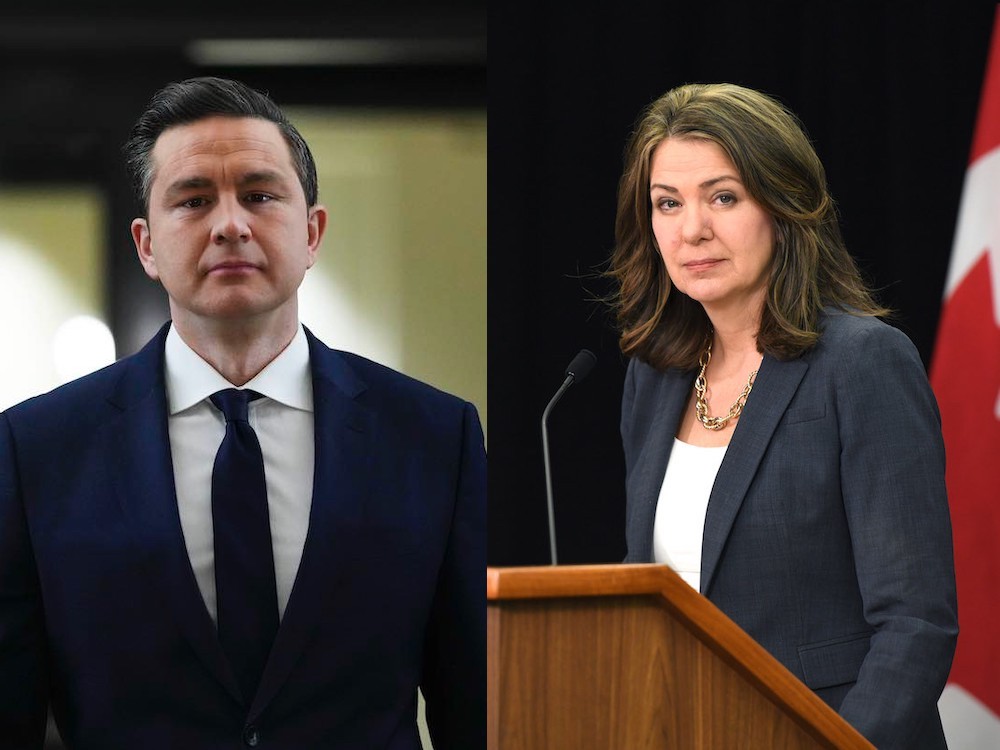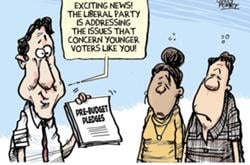Abacus Data’s latest polling has the federal Conservatives out to their biggest lead in over a decade. Unless there is a drastic change over the summer, Canadians ought to prepare for a Conservative majority at some point in the next year or so.
No one should be paying closer attention than Danielle Smith and the United Conservative Party.
A change of government in Ottawa would have a major impact on provincial politics in Alberta. With no whipping boy or scapegoat in Ottawa, the provincial UCP would need to shift focus and even rebrand.
At the same time, the Fair Deal strategy launched by the Jason Kenney government and accelerated by Smith has created a set of demands and expectations upon the next prime minister that may be difficult to walk back.
Poilievre’s potential impact on Alberta
If history is any guide, Alberta premiers are wise to be careful what they wish for when it comes to electing Conservative governments in Ottawa.
Consider the struggles encountered by premiers Ed Stelmach, Alison Redford and Jim Prentice during the Stephen Harper years. Or Don Getty during the Brian Mulroney government.
It’s folly to suggest that these short-term premiers owe their demise solely to the fact that their federal cousins were in power. Yet the absence of a foil in Ottawa was definitely a contributing factor.
This has to do with the nature of conservatism and political strategy in Alberta. The province’s most successful premiers have been able to present themselves as guardians against a marauding federal government. This positioning helps the governing party to maintain control of the political agenda by:
- externalizing opposition (making other provincial parties less relevant);
- focusing attention away from any policy challenges at home (like economic sluggishness, unemployment, affordability, climate change, etc.); and
- turning the federal government into a scapegoat for any problems the province may be facing (see previous bullet).
This “guardian” strategy is very effective when the Liberals are in power in Ottawa. Justin Trudeau’s party has been branded as an ideological, geographic and cultural menace to Alberta for generations. The label sticks even among many moderates and progressives.
The menace becomes less menacing when Conservatives control Parliament, however. Premiers like Getty and Prentice found it challenging to deflect attention away from economic struggles at home, for instance, and the former struggled with guilt by association for national failures. Stelmach lacked a coherent agenda and strategic identity in his term in government, due in part to an inability to assemble an effective intergovernmental relations agenda. For her part, Redford was out of sync with the Harper government, which hampered her ability to deflect, attack or secure concessions from Ottawa to bolster her popularity at home.
A Pierre Poilievre government would present the same challenge for the UCP. Since the party’s formation, it has built its brand around “standing up for Alberta.” That part of its agenda has been the most popular among its base, uniting social conservatives, fiscal conservatives and libertarians to confront a common foe.
Without the enemy at the gates, these groups will need to pick another foil or risk turning against themselves over control of the provincial political agenda. This is precisely what happened during the Harper years, with the rise of the Wildrose Alliance. That vote split eventually cost the conservatives their grip on power in 2015. With a much stronger opposition today, the risks are even higher and the margins for division much tighter.
The Fair Deal albatross
Premiers Kenney and Smith have spent the last five years issuing escalating demands to the federal government. It started with a false threat to remove the equalization principle from the Constitution. Now, it includes more substantive threats to pull out of the Canada Pension Plan, establish a provincial police force to replace the RCMP, supplant the Canada Revenue Agency with a provincial tax agency and reject federal funds earmarked for municipalities, universities and other provincial bodies.
As federal Opposition leader, Poilievre has not faced much pressure to respond to these salvos from Alberta. A notable exception came last year when he stepped out in favour of preserving the province’s place in the Canada Pension Plan.
On the campaign trail in the lead-up to the next federal election, however, it will be more difficult for Poilievre to avoid responding. And if he assumes the prime ministership, he will need to address the unrest out West.
As with many of his predecessors, including Harper, this puts Poilievre in a bind. His party’s most loyal base is in Alberta, yet he needs to preserve the Conservatives’ reach in other parts of Canada if he wants to maintain power. The problem: most of Alberta’s Fair Deal agenda is deliberately designed to provoke (if not offend) Canadians in other parts of the country.
The threats to remove the equalization principle from the Constitution and to pull out of the Canada Pension Plan, in particular, were crafted in large part to get the rest of Canada’s attention and (in Kenney’s words) gain “leverage” in negotiations over other elements of the federal fiscal framework.
This makes it difficult for Poilievre to endorse the Fair Deal agenda, in whole or in part, as it may cost him votes in other parts of Canada.
He may not have to, however.
For his part, Kenney had laid the groundwork for a federal Conservative leader to respond to the Fair Deal demands. Recall that he made holding the equalization referendum contingent on Ottawa failing to repeal laws like the “No More Pipelines Act.” Presumably, had the Conservatives won the 2021 federal election, the plebiscite would have been cancelled. The UCP government could claim that it now had a friendly partner in Ottawa and that the Fair Deal campaign had been suspended in a gesture of goodwill. The Conservative prime minister could then offer some easy wins, like reforms to the fiscal stabilization fund, repealing certain legislation and reintroducing “open federalism” as its intergovernmental relations approach. Win-win.
That route still exists for Smith and Poilievre, if the UCP choose to take it.
Smith’s decision to pause her push toward an Alberta pension plan might be a signal in that direction. The move came after Poilievre threw cold water on the idea. With a Poilievre government in place, Smith might secure gains in other areas of fiscal federalism in return for burying the idea entirely. Same goes for abandoning the notion of an Alberta tax agency.
Equally, Smith could put a moratorium on using the Alberta Sovereignty Act or Provincial Priorities Act in exchange for commitments to return to “open federalism.” She might even commit to renewing the RCMP agreement under slightly better terms for the province.
If Smith chooses this path and finds a willing fellow traveller in Poilievre, the Fair Deal strategy may achieve what Kenney intended initially.
All of this depends on a co-ordinated and orchestrated effort on the part of the federal and provincial Conservative parties. Smith’s recent appearance onstage alongside Poilievre at a Calgary event suggests the relationship between the two camps might be improving on that front.
Perhaps Poilievre’s team is sensing what I’ve outlined above: that in order to avoid the political fallout from an all-out firewall approach during the next federal campaign for Parliament, the federal Conservative leader needs to build bridges with Alberta.
As outlined above, though, if Smith gets too cosy with the federal government, it removes her ability to cast herself as the guardian of the province’s interests.
It’s a dilemma many of her predecessors in the premier’s chair have faced, and quite unsuccessfully. ![]()

















Tyee Commenting Guidelines
Comments that violate guidelines risk being deleted, and violations may result in a temporary or permanent user ban. Maintain the spirit of good conversation to stay in the discussion and be patient with moderators. Comments are reviewed regularly but not in real time.
Do:
Do not: